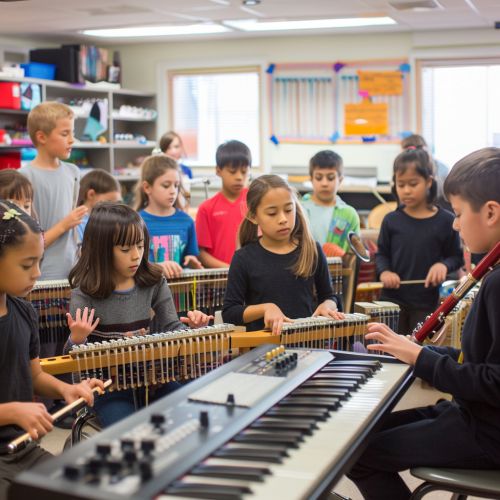Music education
Overview
Music education is a field of study associated with the teaching and learning of music. It touches on all learning domains, including the psychomotor domain (the development of skills), the cognitive domain (the acquisition of knowledge), and, in particular and significant ways, the affective domain (the learner's willingness to receive, internalize, and share what is learned), including music appreciation and sensitivity.
History
Music education has a long history. In the 18th century, the Enlightenment philosopher Jean-Jacques Rousseau introduced ideas about music education in his book Emile, or On Education. Rousseau's ideas have had a profound impact on music education in the United States, and his ideas are still widely debated today.


Approaches
There are several approaches to music education, including the Kodály Method, Orff Schulwerk, and Suzuki Method. Each of these approaches has its own unique set of principles and methods, and they all aim to develop musicality and musicianship in students.
Kodály Method
The Kodály Method is an approach to music education developed in Hungary during the mid-20th century by Zoltán Kodály. His philosophy of education served as inspiration for the method, which was then developed over a number of years by his associates.
Orff Schulwerk
Orff Schulwerk is another approach to music education. It was developed by the German composer Carl Orff and his colleague Gunild Keetman in the early 20th century. The Orff Schulwerk approach encourages students to use music as a means of communicating and expressing themselves.
Suzuki Method
The Suzuki Method is a method of music education that was developed in Japan by Shinichi Suzuki in the mid-20th century. The method aims to create an environment for learning music which parallels the linguistic environment of acquiring a native language.
Benefits
Music education can provide numerous benefits. It can help improve cognitive abilities, enhance social skills, and contribute to emotional well-being. Moreover, music education can foster creativity, help individuals connect with others, and provide a means of self-expression.
Challenges
Despite its many benefits, music education faces several challenges. These include budget cuts, lack of proper training for music teachers, and the undervaluing of music education by some educational institutions.
Future Directions
The future of music education is promising, with new technologies and methodologies continually being developed. These advancements have the potential to greatly enhance the effectiveness and reach of music education.
